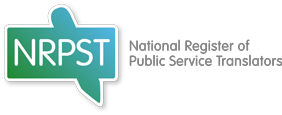Frequently Asked Questions
Is the register of public service translators a separate legal entity?
What is NRPST's relationship to the existing register of public service interpreters?
The register of public service translators is run along similar lines to the NRPSI Register of interpreters. It is an open-access online register of accredited translators who have met the standards set by NRPST for professional practice and agreed to abide by the Code of Professional Conduct. The register of public service translators is separate from the NRPSI Register of interpreters. However, there are links between the two registers to make it easy to identify those language professionals who are registered in both disciplines.
What relationship has NRPST to the existing register of public service interpreters?
The register of public service translators is run along similar lines to the NRPSI Register of interpreters. It is an open-access online register of accredited translators who have met the standards set by NRPST for professional practice and agreed to abide by the Code of Professional Conduct. The register of public service translators is separate from the NRPSI Register of interpreters. However, there are links between the two registers to make it easy to identify those language professionals who are registered in both disciplines.
What is the register of public service translators called?
The register is called the National Register of Public Service Translators (NRPST).
Why have you launched a register of public service translators?
For 30 years, the National Register of Public Service Interpreters (NRPSI) has existed to maintain interpreting standards, protecting those in need of interpreting services as well as public service interpreting professionals. Unfortunately, the same degree of regulation, accountability and support has not been available in the public service translation sector. NRPSI neither accredits translation skills specifically nor upholds professional standards expressly relating to translation other than where translation skills are required as part of an interpreting assignment. Despite this fact, our research and consultation with a variety of stakeholders – including the 150 NRPSI Registrants with a translation qualification – shows that the NRPSI Register of interpreters is being used to source translators, indicating the desire of those seeking translators to work with registered language professionals. Furthermore, it is also evident from a separate NRPSI study of language service users that 25% of them have experienced poor professional conduct from translators in recent years. While there are obvious synergies between interpreting and translation, they are distinctly different disciplines. Each has its own unique skill set, qualifications and National Occupational Standards.
We have therefore concluded that there is a need for a register of translators that is equivalent to the NRPSI Register of interpreters – one that is similarly underpinned by agreed standards of practice and regulated by an independent body free from commercial and other pressures – in order to regulate the public service translation profession, meet the demands of the public services and protect the public.
Consequently, we have launched the new register of translators. With both the new register of translators and existing NRPSI Register of interpreters, we aim to maintain and safeguard the reputation of both public service interpreting and translation professions, educate the users and potential users of both language skills about the differences between the disciplines, and cross-promote the need for professionalism and using professionals in both fields.
Does the same Code of Professional Conduct underpin both NRPST and NRPSI?
Yes, the same Code of Professional Conduct serves as the foundation for both NRPST and NRPSI. We will continue to update the Code of Professional Conduct as necessary to ensure it reflects developments in practice in both disciplines. We will also make sure that the Code takes into account changes in the requirements of the public services and wider environment. The same disciplinary process for complaints is used regardless of whether the complaint is made against a Registered Translator or a Registered Interpreter. In due course, we will recruit Registered Translators in addition to Registered Interpreters to sit on our disciplinary panels.
What does the registration criteria for the new register of public service translators involve?
We have worked with translation and interpreting practitioners, specialising in operating with the public services, on the registration criteria for NRPST, to ensure only those who qualify and meet the requirements of the public services are registered. For those accustomed to the NRPSI Register of interpreters, the way the criteria is structured will be familiar. The registration criteria for the register of translators is published in full on the new website: NRPST.org.uk.
How is the register of public service translators funded and staffed?
NRPST, like NRPSI, is funded by registration fees. This well-recognised funding model for regulators ensures they can remain independent and free from pressure groups. As an independent entity, we can ensure professional standards are central to everything we do. We continue to use the experience and expertise of the staff, board and committee members who work to maintain the NRPSI Register.
Who is the register of public service translators aimed at? What type of professional and user?
The register is aimed at those with the appropriate level of translation expertise who wish to work in a public service setting and are committed to the highest professional standards. Users of the register will encompass the justice system (including solicitors), local government, social services, the health care sector and any other part of the public sector that requires translation services.
When was the new register of public service translators launched?
The NRPST
website (NRPST.org.uk) containing full details of the new register, including its
registration criteria, was live as of December 2019. Due to the Covid pandemic and cost of living crisis, the launch of the register itself took place in January 2024. The register of
translators is open for applications.
What does it cost to become a registered public service translator?
As an existing NRPSI Registrant, how will I benefit from the introduction of the register of public service translators?
By establishing the register of translators, we are emphasising the unique professional requirements of another language skill, thereby stressing the professional status of those linguists who are public service interpreters and those who are public service translators. We are also making it clear that, while there are obvious synergies between them, interpreting and translation are distinctly different disciplines. Each has its own unique skill set, qualifications and National Occupational Standards. Implementing this register of translators is an opportunity for us to further protect the language professions and their registered professionals, not to mention the public, from poor linguistic practice. It is a way to ensure government frameworks and the users of language services understand and consider the differences between interpreting and translation. It also provides us with a further means of raising the profile of language professionals and the services they offer among those in government and the public services. As stated above, the long-standing NRPSI Register of interpreters is already being used to source translators by those seeking to engage the services of registered language professionals. The establishment of this register of public service translators offers the opportunity not only to properly meet the needs of these employers and promote the value of using Registered Translators, but also the means to cross-promote both NRPST and NRPSI Registers. Furthermore, the introduction of a specific register of translators means that NRPSI Registrants with a translation qualification for the first time have the opportunity to register their translation skills and have these recognised.
As a translator who works for the public services or wishes to do so, how will I benefit from becoming a Registered Public Service Translator?
By becoming a Registered Public Service Translator, you have the opportunity to have your specific professional credentials assessed by the Independent Regulator of your profession. You will demonstrate to clients and prospects your commitment to the highest professional standards and that you fulfil the criteria of registration set by your profession’s regulatory body. As stated elsewhere in this FAQs document, we know that the public services are seeking to engage the services of registered language professionals for translation assignments. Becoming a Registered Translator is a way to set yourself apart in the minds of your professional peers and employers from those translators who are unregistered. As a Registered Translator, you will benefit from a listing in the NRPST Register, which prospective clients can use to source translators. You will have access to your listing, essentially your own webpage, which you can use to market your expertise to potential clients. Furthermore, you will be entitled to use the letters ‘RPST’ (Registered Public Service Translator) after your name. By registering, you also have the opportunity to be part of a well-established and highly regarded regulatory organisation that exists to safeguard the quality of both the interpreting and translation professions and promote their value to the users of language services.
What if I’m already registered with NRPSI, do I need to register with NRPST as well?
If you are a
Registered Interpreter, possess translation expertise and meet the qualifications and experience requirements
of the register of translators, you have the option of becoming a
Registered Translator as well. Becoming registered in either or both
disciplines currently remains optional.
Furthermore, in special recognition of the commitment to professionalism they already demonstrate, NRPSI Registrants benefit from a 50% reduction in their NRPST annual registration fee as long as they also remain registered with NRPSI.
All fees are published on the NRPST and NRPSI websites as appropriate.
Doesn’t the NRPSI Register already accredit my translation skills?
Translation skills that might be necessary for an interpreting assignment (referred to as ‘Immediate translations’ in the National Occupational Standards for Interpreting), e.g. assisting the police in producing statements, are a required part of those qualifications (at Level 5 for the translation modules) that meet the NRPSI registration criteria. However, NRPSI neither accredits translation skills, from Level 6 upwards, specifically nor upholds professional standards expressly relating to translation. While there are obvious synergies between interpreting and translation, they are distinctly different disciplines. Each has its own unique skill set, qualifications and National Occupational Standards. For this reason, we have identified a need for a separate register of public service translators.
As an existing user of the NRPSI Register of interpreters, how will I benefit from the introduction of this register of public service translators?
As a language service user, you are most likely responsible for engaging both interpreters and translators. With the new NRPST, you will benefit from working with translators who adhere to the same high standards of professional practice you have come to expect from NRPSI Registered Interpreters. The register of public service translators is open access and easy to use, just like the NRPSI Register of interpreters. There is also a free independent complaints service for those occasions where it is alleged that a NRPST Registrant has not adhered to the Code of Professional Conduct.
Can I register my interest in receiving more information about NRPST?
If you are a
translation professional and interested in learning more about the register
of public service translators’ registration requirements, or you are a user of
translation services and would like to be kept informed about the
new register, please express your interest via contacting admin@nrpst.org.uk



